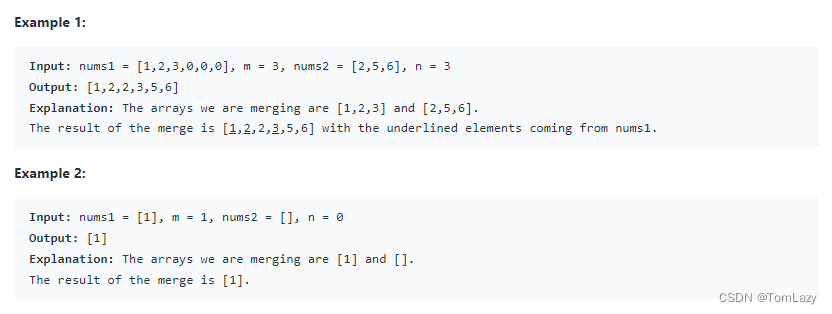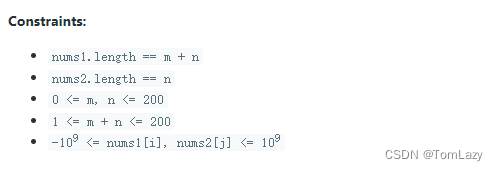-
【LeetCode】No.88. Merge Sorted Array -- Java Version
题目链接:https://leetcode.com/problems/merge-sorted-array/
1. 题目介绍(Merge Sorted Array)
You are given two integer arrays nums1 and nums2, sorted in non-decreasing order, and two integers m and n, representing the number of elements in nums1 and nums2 respectively.
【Translate】:给定两个整数数组
nums1和nums2,它们按非递减顺序排序(递增),以及两个整数m和n,分别表示nums1和nums2中的元素数量。Merge nums1 and nums2 into a single array sorted in non-decreasing order.
【Translate】: 将nums1和nums2合并到一个以非递减顺序排序的数组中。
The final sorted array should not be returned by the function, but instead be stored inside the array nums1. To accommodate this, nums1 has a length of m + n, where the first m elements denote the elements that should be merged, and the last n elements are set to 0 and should be ignored. nums2 has a length of n.
【Translate】:最终排序的数组不应该由函数返回,而是存储在数组nums1中。为了适应这一点,nums1的长度为
m + n,其中前m个元素表示应该合并的元素,最后n个元素设置为0,可以被忽略。Nums2的长度是n。【测试用例】:


【条件约束】:

【跟踪】:

【Translate】:你能想出一个运行时间为O(m + n)的算法吗?2. 题解
2.1 Arrays.sort()
这应该可以算是最简单的做法了,将num2的数加入到num1后,直接使用内置函数。
class Solution { public void merge(int[] nums1, int m, int[] nums2, int n) { for (int i = 0; i < n; i++){ nums1[m+i] = nums2[i]; } Arrays.sort(nums1); } }- 1
- 2
- 3
- 4
- 5
- 6
- 7
- 8

2.2 循序比较+补足 O(m + n)
原题解来自于 jiuwanli 的 My clean java solution。 看来这个题解我突然发现,一开始我忽略了一个重要条件,就是num1和num2其实是已经排好序的递增数组,那么我们直接从最后开始比较就好啦,谁大谁后,最后如果n > m,那么再来一轮循环,顺序填入num1即可。
class Solution { public void merge(int[] nums1, int m, int[] nums2, int n) { int tail1 = m - 1, tail2 = n - 1, finished = m + n - 1; while (tail1 >= 0 && tail2 >= 0) { nums1[finished--] = (nums1[tail1] > nums2[tail2]) ? nums1[tail1--] : nums2[tail2--]; } while (tail2 >= 0) { //only need to combine with remaining nums2, if any nums1[finished--] = nums2[tail2--]; } } }- 1
- 2
- 3
- 4
- 5
- 6
- 7
- 8
- 9
- 10
- 11
- 12
- 13

-
相关阅读:
防火墙综合实验三
研究生选控制嵌入式还是机器视觉好?
C语言日记 37 类的友元(1)(全局函数做友元)
计算机网络【第一章】
3分钟从零解读Transformer的Encoder
rman 如何记录日志及如何对rman命令进行debug
Linux下实现程序开机自启(rc.local 和 systemctl)
浅谈压力测试的作用是什么
QT之xml文件的读写
树莓派Raspberrypi安装Kali Linux保姆教程(通过树莓派安装ARM Kali教程)
- 原文地址:https://blog.csdn.net/qq_41071754/article/details/127751216